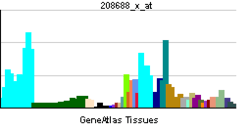EIF3B
| View/Edit Human | View/Edit Mouse |
Eukaryotic translation initiation factor 3 subunit B is a protein that in humans is encoded by the EIF3B gene.[3][4]
Interactions
EIF3B has been shown to interact with P70-S6 Kinase 1[5] and EIF3A.[3][6][7][8]
See also
References
- ↑ "Human PubMed Reference:".
- ↑ "Mouse PubMed Reference:".
- 1 2 Méthot N, Rom E, Olsen H, Sonenberg N (February 1997). "The human homologue of the yeast Prt1 protein is an integral part of the eukaryotic initiation factor 3 complex and interacts with p170". J. Biol. Chem. 272 (2): 1110–6. doi:10.1074/jbc.272.2.1110. PMID 8995410.
- ↑ "Entrez Gene: EIF3S9 eukaryotic translation initiation factor 3, subunit 9 eta, 116kDa".
- ↑ Holz MK, Ballif BA, Gygi SP, Blenis J (November 2005). "mTOR and S6K1 mediate assembly of the translation preinitiation complex through dynamic protein interchange and ordered phosphorylation events". Cell. 123 (4): 569–80. doi:10.1016/j.cell.2005.10.024. PMID 16286006.
- ↑ Mayeur GL, Fraser CS, Peiretti F, Block KL, Hershey JW (October 2003). "Characterization of eIF3k: a newly discovered subunit of mammalian translation initiation factor elF3". Eur. J. Biochem. 270 (20): 4133–9. doi:10.1046/j.1432-1033.2003.03807.x. PMID 14519125.
- ↑ Harris TE, Chi A, Shabanowitz J, Hunt DF, Rhoads RE, Lawrence JC (April 2006). "mTOR-dependent stimulation of the association of eIF4G and eIF3 by insulin". EMBO J. 25 (8): 1659–68. doi:10.1038/sj.emboj.7601047. PMC 1440840
 . PMID 16541103.
. PMID 16541103. - ↑ Block KL, Vornlocher HP, Hershey JW (November 1998). "Characterization of cDNAs encoding the p44 and p35 subunits of human translation initiation factor eIF3". J. Biol. Chem. 273 (48): 31901–8. doi:10.1074/jbc.273.48.31901. PMID 9822659.
Further reading
- Kirken RA, Rui H, Evans GA, Farrar WL (1993). "Characterization of an interleukin-2 (IL-2)-induced tyrosine phosphorylated 116-kDa protein associated with the IL-2 receptor beta-subunit". J. Biol. Chem. 268 (30): 22765–70. PMID 7693677.
- Bonaldo MF, Lennon G, Soares MB (1996). "Normalization and subtraction: two approaches to facilitate gene discovery". Genome Res. 6 (9): 791–806. doi:10.1101/gr.6.9.791. PMID 8889548.
- Asano K, Kinzy TG, Merrick WC, Hershey JW (1997). "Conservation and diversity of eukaryotic translation initiation factor eIF3". J. Biol. Chem. 272 (2): 1101–9. doi:10.1074/jbc.272.2.1101. PMID 8995409.
- Chaudhuri J, Chakrabarti A, Maitra U (1997). "Biochemical characterization of mammalian translation initiation factor 3 (eIF3). Molecular cloning reveals that p110 subunit is the mammalian homologue of Saccharomyces cerevisiae protein Prt1". J. Biol. Chem. 272 (49): 30975–83. doi:10.1074/jbc.272.49.30975. PMID 9388245.
- Block KL, Vornlocher HP, Hershey JW (1998). "Characterization of cDNAs encoding the p44 and p35 subunits of human translation initiation factor eIF3". J. Biol. Chem. 273 (48): 31901–8. doi:10.1074/jbc.273.48.31901. PMID 9822659.
- "Toward a complete human genome sequence". Genome Res. 8 (11): 1097–108. 1998. doi:10.1101/gr.8.11.1097. PMID 9847074.
- Lin L, Holbro T, Alonso G, Gerosa D, Burger MM (2001). "Molecular interaction between human tumor marker protein p150, the largest subunit of eIF3, and intermediate filament protein K7". J. Cell. Biochem. 80 (4): 483–90. doi:10.1002/1097-4644(20010315)80:4<483::AID-JCB1002>3.0.CO;2-B. PMID 11169732.
- Asano K, Shalev A, Phan L, Nielsen K, Clayton J, Valásek L, Donahue TF, Hinnebusch AG (2001). "Multiple roles for the C-terminal domain of eIF5 in translation initiation complex assembly and GTPase activation". EMBO J. 20 (9): 2326–37. doi:10.1093/emboj/20.9.2326. PMC 125443
 . PMID 11331597.
. PMID 11331597. - Mayeur GL, Fraser CS, Peiretti F, Block KL, Hershey JW (2003). "Characterization of eIF3k: a newly discovered subunit of mammalian translation initiation factor elF3". Eur. J. Biochem. 270 (20): 4133–9. doi:10.1046/j.1432-1033.2003.03807.x. PMID 14519125.
- Fraser CS, Lee JY, Mayeur GL, Bushell M, Doudna JA, Hershey JW (2004). "The j-subunit of human translation initiation factor eIF3 is required for the stable binding of eIF3 and its subcomplexes to 40 S ribosomal subunits in vitro". J. Biol. Chem. 279 (10): 8946–56. doi:10.1074/jbc.M312745200. PMID 14688252.
- Beausoleil SA, Jedrychowski M, Schwartz D, Elias JE, Villén J, Li J, Cohn MA, Cantley LC, Gygi SP (2004). "Large-scale characterization of HeLa cell nuclear phosphoproteins". Proc. Natl. Acad. Sci. U.S.A. 101 (33): 12130–5. doi:10.1073/pnas.0404720101. PMC 514446
 . PMID 15302935.
. PMID 15302935. - Rush J, Moritz A, Lee KA, Guo A, Goss VL, Spek EJ, Zhang H, Zha XM, Polakiewicz RD, Comb MJ (2005). "Immunoaffinity profiling of tyrosine phosphorylation in cancer cells". Nat. Biotechnol. 23 (1): 94–101. doi:10.1038/nbt1046. PMID 15592455.
- Olsen JV, Blagoev B, Gnad F, Macek B, Kumar C, Mortensen P, Mann M (2006). "Global, in vivo, and site-specific phosphorylation dynamics in signaling networks". Cell. 127 (3): 635–48. doi:10.1016/j.cell.2006.09.026. PMID 17081983.
- ElAntak L, Tzakos AG, Locker N, Lukavsky PJ (2007). "Structure of eIF3b RNA recognition motif and its interaction with eIF3j: structural insights into the recruitment of eIF3b to the 40 S ribosomal subunit". J. Biol. Chem. 282 (11): 8165–74. doi:10.1074/jbc.M610860200. PMID 17190833.
This article is issued from Wikipedia - version of the 5/20/2016. The text is available under the Creative Commons Attribution/Share Alike but additional terms may apply for the media files.



